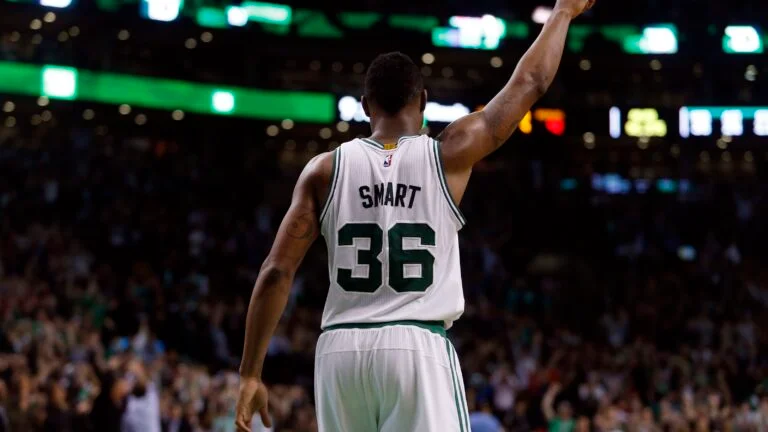
(Jessica Rinaldi/Boston Globe)
Marcus Smart was a great Celtic but it was time to move on
When the Celtics traded away Paul Pierce and Kevin Garnett to the Brooklyn Nets ten years ago this summer, followed shortly by the departure of Doc Rivers, they were officially moving on from the core that had won them a championship in 2008. With those centerpieces went the team’s identity. It was time for a rebuild.
That rebuild consisted of one bad year. A 25-57 finish in Brad Stevens’ first season as head coach, when he was faced with the task of guiding a team led by Rajon Rondo (who missed the first half of the season), Jordan Crawford, Jared Sullinger, Jeff Green, Kelly Olynyk, Gerald Wallace, Kris Humphries, etc.
Now, before we give him his flowers, what we’re not going to do is act like Marcus Smart is the one who brought back that identity and winning culture when he was drafted sixth overall in 2014. I’ve seen that narrative being pushed and it’s just simply inaccurate. The 2014-15 C’s started off 16-30 and were well on their way to another disgraceful record before Isaiah Thomas was acquired at the trade deadline, leading them to finish just two games under .500, clinch the seven seed, and begin a new streak of playoff appearances that has continued to this day. Without IT, Boston could have easily remained basement dwellers for a couple more years before Jaylen Brown and then Jayson Tatum arrived.
What I will say is that the one constant over the Celtics’ current nine-year playoff streak has been number 36, and there’s a reason he stuck around this long while only shooting 38% for his career. As Cedric Maxwell put it, he was the best defender in Celtics history under seven feet. So, before this is interpreted as an “anti Marcus Smart” article, let me be clear. I appreciated the hell out of the guy and will undoubtedly miss his energy and passion. He played his ass off every single time he took the floor. If you’re talking about “leading by example”, he was absolutely the example that the younger players could follow.
The problem is that Marcus was indeed a one-dimensional player. His defense is not only his calling card, it’s the only thing that has really kept him in the league thus far. To be such an elite defensive player and never be considered for an All-Star appearance or All-NBA team speaks to the deficiencies in the other aspects of his game. He’s third all time in three-point attempts in Celtics history, but has the worst percentage (32.3%) out of anyone else in the top 25.
Unfortunately that isn’t the level of production you’re looking for from the most outspoken man in the locker room. And as long as Smart was in Boston, Jayson Tatum wasn’t going to be able to fit into that leader role that we all so desperately want him to embrace. Personally, I want my best player to be the leader. Now the 25 year-old Tatum won’t have a choice but to be more vocal, which is exactly the type of growth we need to see from him moving forward.
As for Kristaps Porzingis, we’ll see. Everyone knows what he can do when healthy and he’s only 27 years old. Staying on the floor is the biggest “if” when it comes to his capabilities. For this reason, it’s impossible to definitively say that the Celtics “won the trade”, but Porzingis’ numbers are better than Smart’s. Add to that, we were nine years deep into the Marcus Smart Experiment and it was becoming increasingly evident that he wasn’t going to be the third guy on a championship team. His role as the toughness ambassador had run stale, as displayed by the Celtics’ glaring lack of toughness in the Eastern Conference Finals against the Miami Heat. I’m sure this wasn’t an easy decision for Brad Stevens, but it was time for change.
